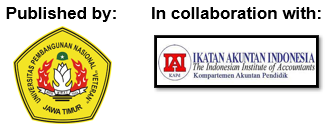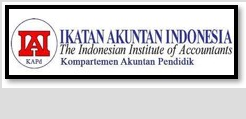Green Accounting and Organization Performance: Science Mapping of Present and Future Trends
DOI:
https://doi.org/10.33005/jasf.v7i1.475Keywords:
Bibliometric analysis, environmental performance, green accounting, sustainability developmentAbstract
Green accounting's main objective is to influence corporate behavior toward social and environmental concerns and address social issues affecting global sustainable development. Establishing green accounting practices in businesses is crucial for community concern and environmental sustainability. This research aims to explore the knowledge structure of green accounting and its impact on organizational performance. Environmental accounting is an important tool in improving the quality of environmental reporting. This study conducted a literature analysis, and the research methodology employed bibliometric analysis. VosViewer, with co-word analysis and bibliographic coupling, is specialized software used to visualize trends in research topics, authorship, and institutional affiliation. Scopus database is chosen due to its extensive coverage and indexing of important journals for articles published between 2005 and 2022. This search yielded 233 documents. This study implies that adopting green accounting has several important elements, namely integrated and transparent sustainability reports that help stakeholders make better decisions. Green accounting increases the accountability and transparency of sustainability reports, as it is supported by structured and measurable information. The board of directors’ support and good corporate governance influence the success of the sustainability report. The company's sustainability performance is assessed using complex methods and involves quantitative and qualitative indicators. This article is the first to present a scientific mapping of green accounting literature, the basis for a study on corporate sustainability performance. The results of this study give scholars, researchers, and practitioners important information about advancements in accounting science, particularly in the area of green accounting.
Downloads
References
Albino, V., Dangelico, R. M., & Pontrandolfo, P. (2012). Do inter-organizational collaborations enhance a firm’s environmental performance? a study of the largest U.S. companies. Journal of Cleaner Production, 37, 304–315. https://doi.org/10.1016/j.jclepro.2012.07.033.
Alfarsi, A., Sherif, Z., Jagtap, S., Gupta, S., & Salonitis, K. (2024). Driving sustainability: assessing KPI effectiveness in the Saudi chemical industry. Discover Sustainability, 5(1). https://doi.org/10.1007/s43621-024-00366-4.
Alrazi, B., De Villiers, C., & Van Staden, C. J. (2015). A comprehensive literature review on, and the construction of a framework for, environmental legitimacy, accountability and proactivity. Journal of Cleaner Production, 102, 44–57. https://doi.org/10.1016/j.jclepro.2015.05.022.
Ardila-Fierro, K. J., & Hernández, J. G. (2021). Sustainability Assessment of Mechanochemistry by Using the Twelve Principles of Green Chemistry. ChemSusChem, 14(10), 2145–2162. https://doi.org/10.1002/cssc.202100478.
Arodudu, O., Therasme, O., Volk, T., Malmsheimer, R., Crovella, P., Germain, R., Kloster, D., & Kumar, D. (2023). Towards a Carbon Accounting Framework for Assessing the Benefits of Biogenic Wood Carbon to Net Zero Carbon Targets, MDPI-Forests, 14(10), 1–14. https://doi.org/10.3390/f14101959.
Arvidsson, S., & Dumay, J. (2022). Corporate ESG reporting quantity, quality and performance: Where to know for environmental policy and practice? Business Strategy and the Environment, 31(3), 1091–1110. https://doi.org/10.1002/bse.2937.
Baboukardos, D. (2018). The valuation relevance of environmental performance revisited: The moderating role of environmental provisions. The British Accounting Review, 50(1), 32–47. https://doi.org/10.1016/j.bar.2017.09.002.
Baboulet, O., & Lenzen, M. (2010). Evaluating the environmental performance of a university. Journal of Cleaner Production, 18(12), 1134–1141. https://doi.org/10.1016/j.jclepro.2010.04.006.
Baghizadeh, K., Zimon, D., & Jum’a, L. (2021). Modeling and optimization sustainable forest supply chain considering discount in transportation system and supplier selection under uncertainty. Forests, 12(8), 1–29. https://doi.org/10.3390/f12080964
Bashir, M., Hameed, A., Bari, M. W., & Ullah, R. (2021). The Impact of Age-Diverse Workforce on Organization Performance: Mediating Role of Job Crafting. SAGE Open, 11(1), 215824402199905. https://doi.org/10.1177/2158244021999058.
Bhat, A. A., Mir, A. A., Allie, A. H., Ahmad Lone, M., Al-Adwan, A. S., Jamali, D., & Riyaz, I. (2024). Unlocking corporate social responsibility and environmental performance: Mediating role of green strategy, innovation, and leadership. Innovation and Green Development, 3(2), 100112. https://doi.org/10.1016/j.igd.2023.100112.
Bian, J., & Zhao, X. (2020). Tax or subsidy? An analysis of environmental policies in supply chains with retail competition. European Journal of Operational Research, 283(3), 901–914. https://doi.org/10.1016/j.ejor.2019.11.052.
Braam, G. J. M., Uit de Weerd, L., Hauck, M., & Huijbregts, M. A. J. (2016). Determinants of corporate environmental reporting: the importance of environmental performance and assurance. Journal of Cleaner Production, 129(2016), 724–734. https://doi.org/10.1016/j.jclepro.2016.03.039.
Castelblanco, G., Guevara, J., Rojas, D., Correa, J., & Verhoest, K. (2023). Environmental Impact Assessment Effectiveness in Public–Private Partnerships: Study on the Colombian Toll Road Program. Journal of Management in Engineering, 39(2). https://doi.org/10.1061/JMENEA.MEENG-5015.
Chamorro, C., Jesús, G., & Vinces, P. (2023). A framework for a green accounting system ‑ exploratory study in a developing country context, Colombia. Environment, Development and Sustainability, 25(9), 9517–9541. https://doi.org/10.1007/s10668-022-02445-w.
Cho, C. H., Michelon, G., & Patten, D. M. (2012). Impression Management in Sustainability Reports: An Empirical Investigation of the Use of Graphs. Accounting and the Public Interest, 12(1), 16–37. https://doi.org/10.2308/apin-10249.
Christofi, A., Christofi, P., & Sisaye, S. (2012). Corporate sustainability: historical development and reporting practices. Management Research Review, 35(2), 157–172. https://doi.org/10.1108/01409171211195170.
Clarkson, P. M., Li, Y., Richardson, G. D., & Vasvari, F. P. (2008). Revisiting the relation between environmental performance and environmental disclosure: An empirical analysis. Accounting, Organizations and Society, 33(4–5), 303–327. https://doi.org/10.1016/j.aos.2007.05.003.
Colicchia, C., Marchet, G., Melacini, M., & Perotti, S. (2013). Building environmental sustainability: empirical evidence from Logistics Service Providers. Journal of Cleaner Production, 59, 197–209. https://doi.org/10.1016/j.jclepro.2013.06.057.
Dahal, R. K. (2022). Management Accounting Practices and Organizational Performance. Problems and Perspectives in Management, 20(2), 33–43. https://doi.org/10.21511/ppm.20(2).2022.04.
Dermawan, W. D., Kusmayadi, D., & Firmansyah, I. (2023). Bibliometric Analysis for Mapping Future Research About Green Accounting Publications. Jurnal Akuntansi dan Perpajakan, 9(2), 148–162. https://doi.org/10.26905/ap.v9i2.9329.
Deswanto, R. B., & Siregar, S. V. (2018). The associations between environmental disclosures with financial performance, environmental performance, and firm value. Social Responsibility Journal, 14(1), 180–193. https://doi.org/10.1108/SRJ-01-2017-0005.
Dev, N. K., Shankar, R., & Qaiser, F. H. (2020). Industry 4.0 and circular economy: Operational excellence for sustainable reverse supply chain performance. Resources, Conservation and Recycling, 153(November 2019), 104583. https://doi.org/10.1016/j.resconrec.2019.104583.
Donthu, N., Kumar, S., Mukherjee, D., Pandey, N., & Lim, W. M. (2021). How to conduct a bibliometric analysis: An overview and guidelines. Journal of Business Research, 133(May), 285–296. https://doi.org/10.1016/j.jbusres.2021.04.070.
Dragomir, V. D. (2012). The disclosure of industrial greenhouse gas emissions: a critical assessment of corporate sustainability reports. Journal of Cleaner Production, 29–30, 222–237. https://doi.org/10.1016/j.jclepro.2012.01.024.
Dyatmika, S. W., Suyanto, B., Setijaningrum, E., & Setioningtyas, W. P. (2023). Redefining Indonesia’s MSMEs Landscape: Unleashing Digital Virality for Sustainable Growth. JASF: Journal of Accounting and Strategic Finance, 6(2), 280–299. https://doi.org/10.33005/jasf.v6i2.471
ElAlfy, A., Palaschuk, N., El-Bassiouny, D., Wilson, J., & Weber, O. (2020). Scoping the evolution of corporate social responsibility (CSR) research in the sustainable development goals (SDGS) era. Sustainability (Switzerland), 12(14). https://doi.org/10.3390/su12145544.
Faheem, A., Nawaz, Z., Ahmed, M., Haddad, H., & Al-Ramahi, N. M. (2024). Past Trends and Future Directions in Green Human Resource Management and Green Innovation: A Bibliometric Analysis. Sustainability (Switzerland), 16(1), 1–20. https://doi.org/10.3390/su16010133.
Franceschelli, M. V., Santoro, G., & Candelo, E. (2018). Business model innovation for sustainability: a food start-up case study. British Food Journal, 120(10), 2483–2494. https://doi.org/10.1108/BFJ-01-2018-0049.
Francoeur, C., Lakhal, F., Gaaya, S., & Ben Saad, I. (2021). How do powerful CEOs influence corporate environmental performance? Economic Modelling, 94(September 2020), 121–129. https://doi.org/10.1016/j.econmod.2020.09.024.
Fuente, J. A., García-Sánchez, I. M., & Lozano, M. B. (2017). The role of the board of directors in the adoption of GRI guidelines for the disclosure of CSR information. Journal of Cleaner Production, 141, 737–750. https://doi.org/10.1016/j.jclepro.2016.09.155.
Hardian, Q. M. P. & Suryaningrum, D. H. (2024). Corporate Social Responsibility Analysis of Green Technology Innovation with Internal Control as an Intervening Variable, Gorontalo Accounting Journal, 7(2), 274-285. https://doi.org/10.32662/gaj.v7i2.3707
Haryati, T., Kirana, N. W. I., Wilasittha, A. A., & Putri, S. Y. (2023). The Effect of Green Accounting Implementation on Islamic University Social Responsibility. Journal of Accounting Science, 7(1), 1–14. https://doi.org/10.21070/jas.v7i1.1654.
Hendratno, S. P. (2016). Corporate Point of View in Green Accounting. Binus Business Review, 7(3), 247–253. https://doi.org/10.21512/bbr.v7i3.1499.
Hens, L., Block, C., Cabello-eras, J. J., Sagastume-gutierez, A., & Garcia-lorenzo, D. (2018). On the evolution of “Cleaner Production” as a concept and a practice. Journal of Cleaner Production, 172, 3323–3333. https://doi.org/10.1016/j.jclepro.2017.11.082.
Higgins, C., & Coffey, B. (2016). Improving how sustainability reports drive change: a critical discourse analysis. Journal of Cleaner Production, 136, 18–29. https://doi.org/10.1016/j.jclepro.2016.01.101.
Jum’a, L., Zimon, D., & Ikram, M. (2021). A relationship between supply chain practices, environmental sustainability, and financial performance: evidence from manufacturing companies in Jordan. Sustainability (Switzerland), 13(4), 1–22. https://doi.org/10.3390/su13042152.
Junior, R. M., Best, P. J., & Cotter, J. (2014). Sustainability Reporting and Assurance: A Historical Analysis on a World-Wide Phenomenon. Journal of Business Ethics, 120(1), 1–11. https://doi.org/10.1007/s10551-013-1637-y.
Khomsiyah, Gunawan, J., & Nilawati, Y. J. (2023). Green Accounting, Environmental Accounting, and Sustainability: A Current and Future Opportunity. AFRE: Accounting and Financial Review, 6(2), 202–211. https://doi.org/10.26905/afr.v6i2.10554.
Kumar, S., Sureka, R., Lim, W. M., Kumar Mangla, S., & Goyal, N. (2021). What do we know about business strategy and environmental research? Insights from Business Strategy and the Environment. Business Strategy and the Environment, 30(8), 3454–3469. https://doi.org/10.1002/bse.2813.
Linnenluecke, M. K., Marrone, M., & Singh, A. K. (2020). Conducting systematic literature reviews and bibliometric analyses. Australian Journal of Management, 45(2), 175–194. https://doi.org/10.1177/0312896219877678.
Liu, G., Tsui, E., & Kianto, A. (2022). Revealing deeper relationships between knowledge management leadership and organisational performance: a meta-analytic study. Knowledge Management Research and Practice, 20(2), 251–265. https://doi.org/10.1080/14778238.2021.1970492.
Liwaul, L., Dali, N., & Sahrun, S. (2023). Evaluating Financial Health and Sustainability of Post-Merger Port Operations in Indonesia: Liquidity and Profitability Insights. JASF: Journal of Accounting and Strategic Finance, 6(2), 236–258. https://doi.org/10.33005/jasf.v6i2.466
Lozano, R. (2020). Analysing the use of tools, initiatives, and approaches to promote sustainability in corporations. Corporate Social Responsibility and Environmental Management, 27(2), 982–998. https://doi.org/10.1002/csr.1860.
Maama, H., & Appiah, K. O. (2019). Green accounting practices: lesson from an emerging economy. Qualitative Research in Financial Markets, 11(4), 456–478. https://doi.org/10.1108/QRFM-02-2017-0013.
Marquis, C., Toffel, M. W., & Zhou, Y. (2016). Scrutiny, Norms, and Selective Disclosure: A Global Study of Greenwashing. Organization Science, 27(2), 483–504. https://doi.org/10.1287/orsc.2015.1039.
Martínez-López, F. J., Merigó, J. M., Valenzuela-Fernández, L., & Nicolás, C. (2018). Fifty years of the European Journal of Marketing: a bibliometric analysis. European Journal of Marketing, 52(1–2), 439–468. https://doi.org/10.1108/EJM-11-2017-0853.
Meseguer-Sánchez, V., Gálvez-Sánchez, F. J., López-Martínez, G., & Molina-Moreno, V. (2021). Corporate social responsibility and sustainability. A bibliometric analysis of their interrelations. Sustainability (Switzerland), 13(4), 1–18. https://doi.org/10.3390/su13041636.
Michelon, G. (2012). Social and Environmental the Nature, Use and Impression Management of Graphs in Social and Environmental Accounting. November 2014. Social and Environmental Accountability Journal, 32(1), 46–47. https://doi.org/10.1080/0969160X.2012.656420.
Nguyen, T. T. (2023). Challenges in green accounting: Sustainable development for companies listed on the Vietnam stock exchange. International Journal of Advanced and Applied Sciences, 10(12), 56–65. https://doi.org/10.21833/ijaas.2023.12.007.
Orazalin, N., & Mahmood, M. (2020). Determinants of GRI-based sustainability reporting: evidence from an emerging economy. Journal of Accounting in Emerging Economies, 10(1), 140–164. https://doi.org/10.1108/JAEE-12-2018-0137.
Peters, G. F., & Romi, A. M. (2015). The Association between Sustainability Governance Characteristics and the Assurance of Corporate Sustainability Reports. Auditing: A Journal of Practice & Theory, 34(1), 163–198. https://doi.org/10.2308/ajpt-50849.
Pretty, J., Benton, T. G., Bharucha, Z. P., Dicks, L. V., Flora, C. B., Godfray, H. C. J., Goulson, D., Hartley, S., Lampkin, N., Morris, C., Pierzynski, G., Prasad, P. V. V., Reganold, J., Rockström, J., Smith, P., Thorne, P., & Wratten, S. (2018). Global assessment of agricultural system redesign for sustainable intensification. Nature Sustainability, 1(8), 441–446. https://doi.org/10.1038/s41893-018-0114-0.
Purbawangsa, I. B. A., Solimun, S., Fernandes, A. A. R., & Mangesti Rahayu, S. (2020). Corporate governance, corporate profitability toward corporate social responsibility disclosure and corporate value (comparative study in Indonesia, China and India stock exchange in 2013-2016). Social Responsibility Journal, 16(7), 983–999. https://doi.org/10.1108/SRJ-08-2017-0160.
Rahman, M. A., Sumarlin, S., & Mus, S. F. (2019). Green Accounting Concept Based on University Social Responsibility as A Form of University Environmental Awareness. Integrated Journal of Business and Economics, 3(2), 164–178. https://doi.org/10.33019/ijbe.v3i2.156.
Rehman, S. U., Bhatti, A., Kraus, S., & Ferreira, J. J. M. (2020). The role of environmental management control systems for ecological sustainability and sustainable performance. Management Decision, 59(9), 2217–2237. https://doi.org/10.1108/MD-06-2020-0800.
Rizka, H. N., Hastina, H., & Pramono, S. E. (2024). A Bibliometric Analysis of Green Accounting Research. JAS: Jurnal Akuntansi Syariah, 8(1), 37–53. https://doi.org/10.46367/jas.v8i1.1737.
Saleh, G. R. ., & Suryaningrum, D. H. (2023). The Moderating Effect of Goodwill and Goodwill Impairment on Global Energy Crisis and Corporate Cash Holding. JASF: Journal of Accounting and Strategic Finance, 5(2), 331–350. https://doi.org/10.33005/jasf.v5i2.338
Sarcea, O. A., Zbuchea, A., & Pinzaru, F. (2024). Mapping Organizational Performance Using Digital Technologies. Proceedings of the International Conference on Business Excellence, 18(1), 3530–3542. https://doi.org/10.2478/picbe-2024-0286.
Sari, I. A., & Amalia, M. M. (2019). The Effect of Responsibility Accounting and Strategy Implementation on Organizational Performance. Sustainable Business Accounting and Management Review, 1(1), 9-18. https://doi.org/10.61656/sbamr.v1i1.24
Taqi, M., Rusydiana, A. S., Kustiningsih, N., & Firmansyah, I. (2021). Environmental Accounting: A Scientometric Using Biblioshiny. International Journal of Energy Economics and Policy, 11(3), 369–380. https://doi.org/10.32479/ijeep.10986.
Tiberius, V., Rietz, M., & Bouncken, R. B. (2020). Performance Analysis and Science Mapping of Institutional Entrepreneurship Research. Administrative Sciences, 10(3), 1–21. https://doi.org/10.3390/admsci10030069.
Townsend, J., & Barrett, J. (2013). Exploring the applications of carbon footprinting towards sustainability at a UK university: reporting and decision making. Journal of Cleaner Production, 107, 164-176. https://doi.org/10.1016/j.jclepro.2013.11.004.
Unerman, J., Bebbington, J., & O’dwyer, B. (2018). Corporate reporting and accounting for externalities. Accounting and Business Research, 48(5), 497–522. https://doi.org/10.1080/00014788.2018.1470155.
Van Hoang, T. H., Przychodzen, W., Przychodzen, J., & Segbotangni, E. A. (2021). Environmental transparency and performance: Does the corporate governance matter? Environmental and Sustainability Indicators, 10. https://doi.org/10.1016/j.indic.2021.100123.
Weber, O., Diaz, M., & Schwegler, R. (2014). Corporate Social Responsibility of the Financial Sector – Strengths, Weaknesses and the Impact on Sustainable Development. Sustainable Development, 22(5), 321–335. https://doi.org/10.1002/sd.1543.
Wiedmann, T. O., Lenzen, M., & Barrett, J. R. (2009). Companies on the Scale Comparing and Benchmarking the Sustainability Performance of Businesses. Industrial Ecology, 13(3), 361–383. https://doi.org/10.1111/j.1530-9290.2009.00125.x.
Yadava, R. N., & Sinha, B. (2016). Scoring Sustainability Reports Using GRI 2011 Guidelines for Assessing Environmental, Economic, and Social Dimensions of Leading Public and Private Indian Companies. Journal of Business Ethics, 138(3), 549–558. https://doi.org/10.1007/s10551-015-2597-1.
Yawar, S. A., & Seuring, S. (2017). Management of Social Issues in Supply Chains: A Literature Review Exploring Social Issues, Actions and Performance Outcomes. Journal of Business Ethics, 141(3), 621–643. https://doi.org/10.1007/s10551-015-2719-9.
Zhang, H., Song, D., & Chen, Y. (2024). Should Start-Ups Be Green? Corporate Environmental Responsibility, Institutional Contexts, and Financial Performance of New Ventures. Entrepreneurship Research Journal, 14(3), 1519–1545. https://doi.org/10.1515/erj-2021-0473.
Zhou, G., Liu, L., & Luo, S. (2022). Sustainable development, ESG performance and company market value: Mediating effect of financial performance. Business Strategy and the Environment, 31(7), 3371–3387. https://doi.org/10.1002/bse.3089.














